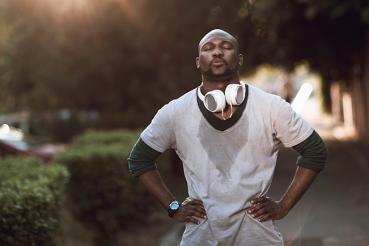Back in the old days, we applied fingers to wrists to check our heart rate, used signs and maps to figure out how far we had run, and counted our steps by, well, counting our steps.
But technology is rapidly changing how we monitor our activities and our overall health, thanks to a slew of ever-evolving fitness trackers you can wear on your wrist, attach to your shirt or strap to your chest.
From Garmin to Fitbit to the Apple Watch — to name just a few — these devices offer a growing array of features: They calculate your steps, gauge your mileage and pace via GPS, monitor your heart rate, count your calories, even see how you sleep.
Then they ship all the data back to your computer or smartphone for easy review.
Monitor your progress
While these wearable devices may have seemed faddish at first, they've gone decidedly mainstream. And doctors say they can deliver bona fide health benefits.
"We've been measuring blood pressure, weight, cholesterol and glucose levels for a long time," says Jill Boroniec, MD, a family medicine physician at Rush University Medical Center, "but now it's nice to actually be able to quantify other measures of health, such as activity, sleep and food intake."
Once you're able to measure something, she says, you're able to track it over time.
"It becomes easier to make changes and see your progress, and I think that helps motivate some people."
Studies have shown that simply logging food intake can lead to decreased calories consumed.
When tracking pays off
Here are three areas where getting inside information can help:
1. Exercise. The devices remove some of the guesswork by providing a relatively accurate account of your overall activity. While you may think you’re hitting the American Heart Association's recommended goal of 10,000 steps per day — that's about five miles — your Fitbit could indicate otherwise.
Having that information gives you a starting point and something to improve upon. Even if it's a small amount — for example, adding 2,000 extra steps a day or squeezing in an extra 10-minutes at the gym — it's something you can measure.
2. Diet. One reason dieters give up is because they aren't seeing results right away. Keeping tabs on what you eat and knowing you're sticking to your goal can help ease that need for instant gratification.
A device might also inspire you to work a little harder to achieve your weight loss goal, Boroniec says. "Studies have shown that simply logging food intake can lead to decreased calories consumed," she says.
3. Sleep. Chronic sleep deprivation over time, Boroniec notes, can lead to mood disorders and problems with concentration and alertness. So a tool to help monitor your sleep at home can be invaluable.
In addition to detecting how long you've slept, wearable devices can sense extensive movement during sleep, which may indicate less-than-restful slumber.
"A lot of people think, 'Well, I get to bed at 11 each night and I'm up at 7, so I'm getting eight hours.' But many people will toss and turn for an hour or wake up several times during the night," Boroniec explains. "It's really important to realize that."
Occasional fitful sleep probably doesn't indicate a serious health problem, but ongoing sleep issues could be a sign of sleep apnea, anxiety or depression, among other issues.
"All of that information can help us ask the right questions to see if something else might be going on," Boroniec says.
What to get?
So are you ready to buy one? With so many devices on the market, and so much variation in what they can do, at so many price points, you'll want to figure out what you really need to get out of it.
Keep in mind that some fitness trackers connect wirelessly to your laptop or smartphone, while others may require you to synch with the computer via a USB cable. You may also want to synch data with other fitness websites or smartphone apps like Apple's highly touted Health app, so check compatibility before you buy.
And don't discount the importance of aesthetics.
"You also want one that looks nice and fits in with your daily attire," Boroniec says. "You don't want something that you're embarrassed to be wearing."
If a Fitbit doesn't fit your budget, you do have less costly options.
"You can buy a pedometer for 10 dollars that will track your steps in much the same way," she says. "And a food diary is great for tracking what you eat. All you need is paper and a pen."




